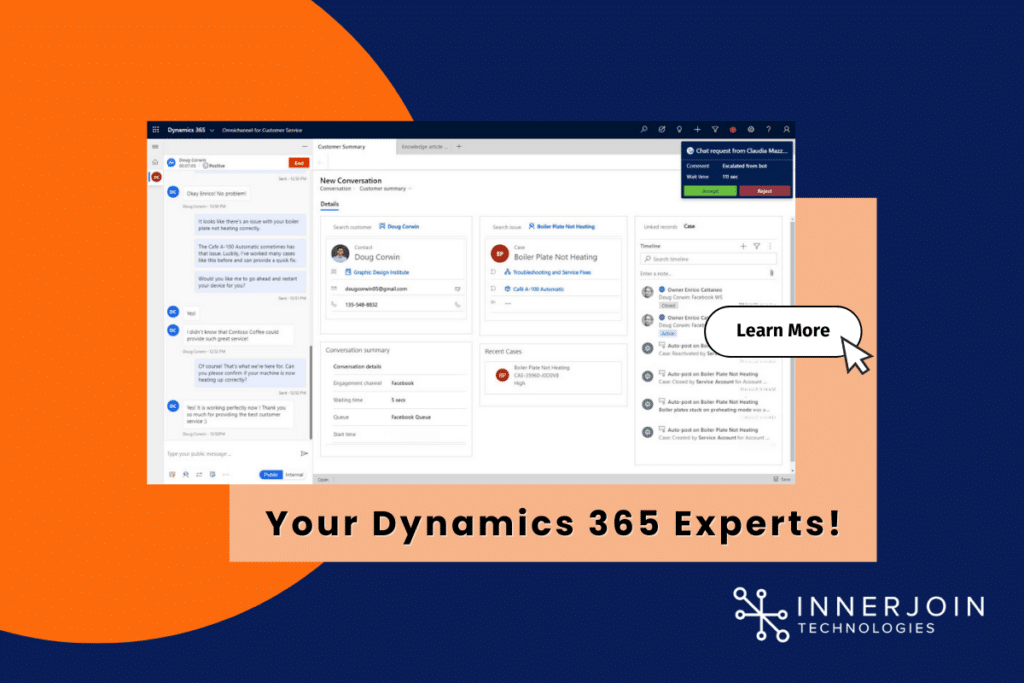In today’s competitive business landscape, companies must stay ahead by optimizing their processes and enhancing customer relationships. One powerful tool that can help achieve this is Microsoft Dynamics 365. This robust suite of business applications integrates CRM and ERP capabilities, empowering organizations to streamline operations and foster stronger connections with customers. In this blog, we will explore how you can maximize efficiency with Dynamics 365 and leverage its features for superior customer relationship management (CRM).
Understanding Microsoft Dynamics 365
Microsoft Dynamics 365 is a cloud-based solution that combines enterprise resource planning (ERP) and customer relationship management (CRM) functionalities. It offers a comprehensive range of applications tailored to meet the needs of various business functions, including sales, customer service, finance, operations, and marketing. By integrating these applications, Dynamics 365 provides a unified platform that promotes seamless collaboration and data-driven decision-making.
Key Features of Dynamics 365 CRM
Before delving into how Dynamics 365 can enhance efficiency and customer relationship management, let’s highlight some of its key features:
- Unified Customer Data Platform: Dynamics 365 aggregates customer data from various sources, providing a 360-degree view of customer interactions. This unified platform enables personalized engagement and better understanding of customer needs.
- Sales Automation: The sales module automates repetitive tasks, such as lead scoring, opportunity tracking, and pipeline management. This automation frees up time for sales teams to focus on building relationships and closing deals.
- Customer Service Management: Dynamics 365 offers tools for case management, service level agreements (SLAs), and knowledge base creation. These features help in resolving customer issues promptly and efficiently.
- Marketing Automation: The marketing module allows businesses to design and execute targeted campaigns, track customer responses, and analyze campaign effectiveness. This ensures that marketing efforts are aligned with customer preferences and behaviors.
- AI and Analytics: Built-in artificial intelligence and analytics capabilities provide actionable insights, predictive analytics, and recommendations. These insights enable proactive decision-making and continuous improvement.
Maximizing Efficiency with Dynamics 365
Now that we have an overview of Dynamics 365’s features, let’s explore how to maximize efficiency using this powerful tool.
- Streamlining Sales Processes
Efficiency in sales processes is crucial for driving revenue and achieving business goals. Dynamics 365 offers several features to streamline sales activities:
- Lead Management: Dynamics 365 allows for efficient lead capture and tracking, ensuring that no potential opportunity is overlooked. Automated lead scoring helps prioritize leads based on their likelihood to convert, allowing sales teams to focus on high-potential prospects.
- Opportunity Management: The platform provides a centralized view of all sales opportunities, enabling sales representatives to track progress, manage pipelines, and collaborate with team members. This transparency ensures that everyone is aligned and working towards common objectives.
- Sales Insights: With built-in AI, Dynamics 365 offers predictive analytics and insights into customer behavior. Sales teams can use these insights to tailor their approach, anticipate customer needs, and close deals more effectively.
- Enhancing Customer Service
Exceptional customer service is a key differentiator in today’s market. Dynamics 365 empowers organizations to deliver superior customer experiences through:
- Case Management: The platform provides a comprehensive case management system that allows customer service agents to log, track, and resolve issues efficiently. Automated workflows and SLAs ensure that cases are handled promptly.
- Knowledge Base: Dynamics 365 includes a knowledge base where agents can access relevant information and resources to resolve customer queries quickly. This reduces response times and enhances the quality of service.
- Multi-Channel Support: Customers expect support through various channels, including phone, email, chat, and social media. Dynamics 365 integrates these channels, ensuring a seamless and consistent experience across all touchpoints.
- Automating Marketing Campaigns
Effective marketing is essential for attracting and retaining customers. Dynamics 365’s marketing automation capabilities help businesses run targeted campaigns with precision:
- Segmentation: Dynamics 365 allows for sophisticated audience segmentation based on demographics, behavior, and preferences. This ensures that marketing messages are relevant and personalized.
- Campaign Management: The platform enables the creation and management of multi-channel campaigns, including email, social media, and events. Automation features streamline campaign execution and tracking.
- Analytics and Reporting: Dynamics 365 provides detailed analytics and reporting on campaign performance. Marketers can measure ROI, track engagement metrics, and optimize future campaigns based on data-driven insights.
- Leveraging AI and Analytics
Artificial intelligence and advanced analytics are at the core of Dynamics 365’s capabilities. These technologies drive efficiency and effectiveness across all business functions:
- Predictive Analytics: Dynamics 365 uses machine learning algorithms to predict customer behavior, identify trends, and recommend actions. This helps businesses stay ahead of the curve and make proactive decisions.
- Customer Insights: The platform consolidates data from various sources to provide deep insights into customer preferences, buying patterns, and sentiment. These insights enable personalized engagement and improved customer satisfaction.
- Performance Monitoring: Dynamics 365 offers real-time dashboards and reports that monitor key performance indicators (KPIs). This visibility allows businesses to track progress, identify bottlenecks, and make informed adjustments.
Leveraging Dynamics 365 for Better Customer Relationship Management
Customer relationship management is at the heart of Dynamics 365. Here are some strategies to leverage its capabilities for superior CRM:
- Building a Unified Customer View
A unified customer view is essential for personalized engagement and effective CRM. Dynamics 365 integrates data from various touchpoints, including sales, service, and marketing, to create a comprehensive profile for each customer. This 360-degree view enables businesses to understand customer needs, preferences, and behaviors, leading to more meaningful interactions.
- Personalizing Customer Engagement
Personalization is key to building strong customer relationships. Dynamics 365’s AI-driven insights help businesses tailor their interactions based on individual customer profiles. Personalized engagement can include targeted marketing messages, customized product recommendations, and proactive customer support.
- Improving Customer Retention
Retaining existing customers is more cost-effective than acquiring new ones. Dynamics 365 offers tools to enhance customer retention through:
- Loyalty Programs: Businesses can design and implement loyalty programs to reward repeat customers. Dynamics 365 tracks customer participation and provides insights into program effectiveness.
- Customer Feedback: The platform includes survey and feedback tools to gather customer opinions and measure satisfaction. Analyzing this feedback helps identify areas for improvement and demonstrates a commitment to customer satisfaction.
- Proactive Service: With predictive analytics, businesses can anticipate customer needs and address potential issues before they escalate. This proactive approach builds trust and loyalty.
- Enabling Cross-Functional Collaboration
Effective CRM requires collaboration across various departments, including sales, marketing, and customer service. Dynamics 365’s integrated platform fosters cross-functional collaboration by providing a single source of truth for customer data. Teams can share insights, coordinate efforts, and work towards common goals, resulting in a cohesive and efficient CRM strategy.
Implementing Dynamics 365 for Your Business
Implementing Dynamics 365 requires careful planning and execution. Here are some steps to ensure a successful implementation:
- Define Your Objectives
Before implementing Dynamics 365, clearly define your business objectives and goals. Identify the specific areas where you want to improve efficiency and enhance customer relationship management. This clarity will guide your implementation strategy and ensure alignment with your business needs.
- Choose the Right Modules
Dynamics 365 offers a range of modules tailored to different business functions. Select the modules that align with your objectives and provide the most value for your organization. Consider starting with core modules, such as Sales, Customer Service, and Marketing, and expand as needed.
- Plan for Data Migration
Migrating data from legacy systems to Dynamics 365 is a critical step. Ensure that your data is clean, accurate, and organized before migration. Develop a detailed migration plan, including data mapping, transformation, and validation, to ensure a smooth transition.
- Train Your Team
Proper training is essential for maximizing the benefits of Dynamics 365. Provide comprehensive training for your team members to ensure they are proficient in using the platform. Consider ongoing training and support to keep up with updates and new features.
- Monitor and Optimize
After implementation, continuously monitor the performance of Dynamics 365 and gather feedback from users. Use analytics and reporting tools to measure the impact on efficiency and customer relationship management. Make necessary adjustments and optimizations to achieve your business goals.
Conclusion
Microsoft Dynamics 365 is a powerful tool for maximizing efficiency and enhancing customer relationship management. By leveraging its features, businesses can streamline sales processes, deliver exceptional customer service, automate marketing campaigns, and gain valuable insights through AI and analytics. Implementing Dynamics 365 requires careful planning, but the benefits of a unified, data-driven platform are well worth the effort. Embrace Dynamics 365 to stay ahead in the competitive business landscape and build lasting relationships with your customers.
By following these strategies and best practices, your organization can unlock the full potential of Microsoft Dynamics 365 and achieve greater efficiency and superior customer relationship management. InnerJoin Technology is here to help you navigate this journey and ensure a successful implementation tailored to your unique business needs. Contact us today to learn more about how Dynamics 365 can transform your business!


